Reply To:
Name - Reply Comment
Last Updated : 2024-04-24 19:15:00
Activists discuss taxing period products in Sri Lanka and its implications on women and girls
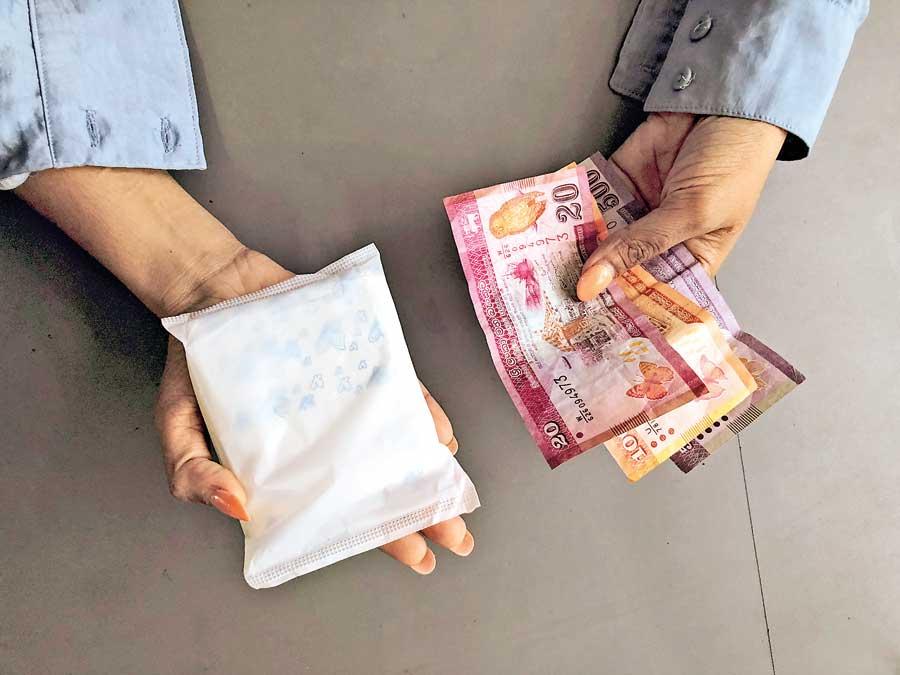
In a partial triumph for activists demanding menstrual equity -the easy availability and accessibility of menstrual hygiene products- last week the Government scrapped the 15% general duty imposed on sanitary napkins. Accordingly, sanitary pads and tampons are now taxed at 42.9% instead of the earlier 52%. With this debates on taxing “period products” have surfaced once again.
menstrual hygiene products- last week the Government scrapped the 15% general duty imposed on sanitary napkins. Accordingly, sanitary pads and tampons are now taxed at 42.9% instead of the earlier 52%. With this debates on taxing “period products” have surfaced once again.
In Sri Lanka, this debate has largely showcased how women’s needs are constantly being overshadowed by political divides. Rather than a policy dialogue or a discussion on the biological needs of women, taxing sanitary pads has been more of a political conversation, especially during the 2019 Presidential election. This resulted in Opposition leader Sajith Premadasa being called ‘Pad Man’ further portraying how this topic is often trivialised and considered a taboo topic.
The Advocata Institute this week organized an online talk with four women who have extensively researched the taxation of sanitary products and its implications on menstruating women and girls in Sri Lanka.
“I think the biggest issue here to me is that the tax around sanitary napkins was just not discussed for the longest time. It was not something that was flagged as an issue. Women were still not converting to sanitary napkins or further into more sustainable menstrual hygiene products’’.
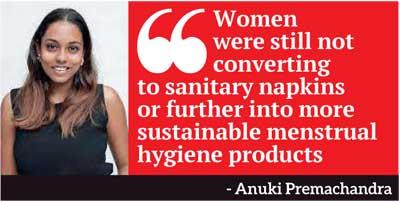 “And I think that’s really talk where the issue lies, just the lack of discussion around this within the policy space. We don’t really about the implications, for example, the tax. So right now, within the policy space, the attempt is to try to remove or reduce the tariffs,” said Activist Anuki Premachandra, Director of Communications at IREX, who has been actively discussing the need to slash taxes on period products in Sri Lanka.
“And I think that’s really talk where the issue lies, just the lack of discussion around this within the policy space. We don’t really about the implications, for example, the tax. So right now, within the policy space, the attempt is to try to remove or reduce the tariffs,” said Activist Anuki Premachandra, Director of Communications at IREX, who has been actively discussing the need to slash taxes on period products in Sri Lanka.
The participants also discussed how there are very few sanitary products available in the market with the current crisis in Sri Lanka.
"You know, most of the aisles are empty. A lot of the lower-cost alternatives are wiped out. And that is a very unfortunate reality because we’re living in a crisis. It is very difficult to purchase day to day things. So I feel situations like this exacerbated and I think that’s where there’s conversation into the policy space"
“You know, most of the aisles are empty. A lot of the lower-cost alternatives are wiped out. And that is a very unfortunate reality because we’re living in a crisis. It is very difficult to purchase day to day things. So I feel the situation exacerbated and I think that’s where there’s conversation needed into the policy space,” Anuki added.
Sathya Karunarathne, Policy Research Analyst at the Advocata Institute said that it is highly commendable that the 15% general duty has been taken away by the Government.
“But while commending the Government, I think our attention should be on the fact that there is still a 10% PAL and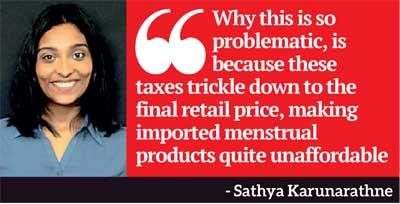 a 15% CESS on that. Let’s talk about why these tariffs become problematic. Sri Lanka’s border taxes are a mixture of tariffs and para-tariffs. So why this is so problematic, is because these taxes trickle down to the final retail price, making imported menstrual products quite unaffordable,” she said.
a 15% CESS on that. Let’s talk about why these tariffs become problematic. Sri Lanka’s border taxes are a mixture of tariffs and para-tariffs. So why this is so problematic, is because these taxes trickle down to the final retail price, making imported menstrual products quite unaffordable,” she said.
“We’ve looked at the retail prices of menstrual products from last year to this year, both locally produced and imported, and it’s quite alarming actually. The average retail price of a locally produced sanitary napkin packet with eight pieces has increased by 30.41%. We’ve looked at retail prices from January to May 2022. The average retail price of a locally produced sanitary napkin packet with 10 pieces has increased by 30.06%. And a locally produced pack with 20 pieces, the average retail price has increased by 26.78%,” Sathya said.
She added that they also had observed that the retail prices of imported sanitary napkin packets with 15 pieces have not increased.
"What this does is that you also normalize absenteeism. The Government pays every day a certain amount per child to go to school. When you make it impossible for a child to go to school while she’s menstruating, the Government also loses out money, and it is the same when it comes to the formal economy"
“Very interestingly though, when you look at the price, it is more expensive than the most expensive locally produced sanitary napkin price. So once again that shows the importance of removing these tariffs,” Sathya said.
“I think we also need to talk about the competition in the market. As we all know, there is this one big brand of imported sanitary napkins that comes into the market. And then when there are tariffs and para-tariffs imposed on these, what happens is that it becomes quite unaffordable in the domestic market.
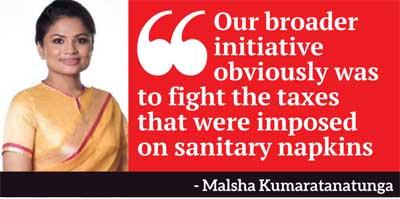 “What this essentially does is, it creates the room for the few domestic producers to market their prices to match up to the inflated price of the imported product. So what we’re essentially seeing here is that these local producers making a supernormal profit, they’re making more profit than they essentially should,” the researcher explained.
“What this essentially does is, it creates the room for the few domestic producers to market their prices to match up to the inflated price of the imported product. So what we’re essentially seeing here is that these local producers making a supernormal profit, they’re making more profit than they essentially should,” the researcher explained.
Delving further into the unaffordability of sanitary products in Sri Lanka, the participants spoke of ‘Free to Flow’ an initiative to end the “period poverty” in Sri Lanka, founded by activist and politician Malsha Kumaranatunga.
“Starting Free to Flow was just a small way we could give a helping hand to women out there. It is more environmentally friendly to use reusable sanitary napkins. We’ve seen this movement of reusables taking over all over the world and lots of women are now switching to reusable sanitary products. So through our organization, we offered a helping hand to women. Our broader initiative obviously was to fight the taxes that were imposed on sanitary napkins,” Malsha said.
She added that through their efforts, they will be able to give Sri Lankan women and girls access to sanitary napkins that are cheaper and affordable.
While affordability and price are concerns, one researcher pointed out that Sri Lankan historically has never had gender budgeting. “It’s to do with the fact that in politics, you have 95% of men making decisions for 52% of the population. The fact that we don’t have gender budgeting goes on to show how officials just do not care about issues that relate to women. But what we also now need to start understanding is that by imposing such a large tax on the majority of the population, it has a huge economic and health cost,” explained feminist researcher Lakmini Jayathilake.
“What this does is that you also normalise absenteeism. The Government pays every day a certain amount per child to go to school. When you make it impossible for a child to go to school while she’s menstruating, the Government also loses out money, and it is the same when it comes to the formal economy.
“For the past two decades, Sri Lanka has had a stagnant rate of women in the formal economy. We don’t have a conducive environment for women to participate in the formal economy. Similarly, women-centric taxes that are imposed just on one part of the population play a significant role in women’s contribution to the formal economy” she added.
On average, a woman has her menstrual period from three to seven days. The average women menstruates from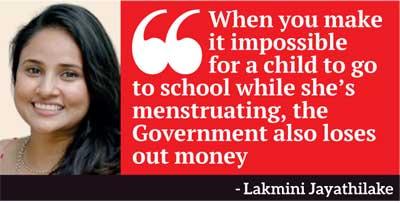 the age of 13 years until the age of 51, adding up to a total of some 450 of period cycles for roughly 38 years. It amounts to 2,280 days of menstrual periods. That’s nearly six and a half years of a woman’s life, making sure that she has a sanitary pad with her at all times. The physical discomfort and cramps can be the worst part of the entire experience, but in most countries, it’s not the only one.
the age of 13 years until the age of 51, adding up to a total of some 450 of period cycles for roughly 38 years. It amounts to 2,280 days of menstrual periods. That’s nearly six and a half years of a woman’s life, making sure that she has a sanitary pad with her at all times. The physical discomfort and cramps can be the worst part of the entire experience, but in most countries, it’s not the only one.
In Sri Lanka, little research has been conducted about access to menstrual products for people who are from low-income households. The reality however is that young adults may suffer lifelong consequences because they lack access to menstrual products, as missing just a few days of school can lead to significant performance gaps, as activists point out.

Add comment
Comments will be edited (grammar, spelling and slang) and authorized at the discretion of Daily Mirror online. The website also has the right not to publish selected comments.
Reply To:
Name - Reply Comment
US authorities are currently reviewing the manifest of every cargo aboard MV
On March 26, a couple arriving from Thailand was arrested with 88 live animal
According to villagers from Naula-Moragolla out of 105 families 80 can afford
Is the situation in Sri Lanka so grim that locals harbour hope that they coul